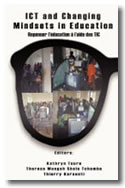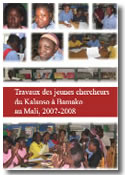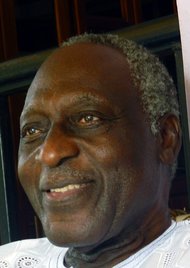Ghanaians Mourn a Poet and Scholar Killed in Nairobi Mall Attack September 24, 2013
The rain has beaten me
And the sharp stumps cut as keen as knives
I shall go beyond and rest,
I have no kin and no brother,
Death has made war upon our house
DAKAR, Senegal — Ghanaian schoolchildren memorized those lines from the 1960s by one of their country’s most famous poets, Kofi Awoonor; their sorrow over the newly liberated continent’s travails foreshadowed, in a terrible way, the violence that took Mr. Awoonor’s life on Saturday.
Mr. Awoonor — poet, diplomat, statesman, scholar and cultural icon in his native Ghana — was killed in the terrorist attack by Somali militants on the Westgate shopping mall in Nairobi. His death at 78 has shocked citizens in Ghana, the West African nation whose difficult beginnings and subsequent steadying he accompanied and chronicled.
Mr. Awoonor published novels and books of verse, including poems like “Songs of Sorrow” that were required reading for several generations of Ghanaian schoolchildren. He was his country’s ambassador to the United Nations in the early 1990s, taught at universities in the United States and Ghana, knew W. E. B. DuBois, and was president of Ghana’s Council of State, a governmental advisory body. News reports in Ghana said he had been invited to a conference in Nairobi and had gone to the mall to have breakfast with his son, who was wounded in the attack.
“He had a huge influence on Ghanaian poetry and Ghanaian academia,” said Akwasi Aidoo, a Ghanaian who is executive director of TrustAfrica, a pan-African good-governance foundation, who knew Mr. Awoonor for nearly 40 years. “He was one of the first poets after Ghanaian independence.”
Because Mr. Awoonor was imprisoned for his activism during a time of repression in the mid-1970s, “we saw him more as an organic intellectual, as somebody who was not just confined to academia, somebody interested in the broader economic and social struggle,” Mr. Aidoo said.
His poetry was heavily influenced by the funeral dirges of his native Ewe people, one of Ghana’s smaller ethnic minorities; his grandmother was an Ewe dirge singer, according to the Poetry Foundation. The early poetry that gained him his reputation in the 1960s in Ghana “reflected the challenges that Ghana and Africa were going through during the postcolonial period,” Mr. Aidoo said. “He was constantly emphasizing the pain, the pain and suffering of our people.”
“Songs of Sorrow,” perhaps his best-known poem, is an extended lament for a world of African difficulty and hardship, replete with foreboding of latent chronic violence of the sort that erupted on Saturday in Nairobi. A pan-Africanist and admirer of Kwame Nkrumah, the president who led Ghana to independence and was overthrown in a coup, Mr. Awoonor was pained by the continent’s early travails.
“Funeral dirges — he used that form to lament the state of Africa, the oppression,” said Esi Sutherland-Addy, an associate professor at the University of Ghana. “It was a convenient form to talk about oppression.”
Public figures in Ghana, including President John Dramani Mahama, expressed their sorrow at Mr. Awoonor’s death. “I think we’re all in shock,” Ms. Sutherland-Addy said.
By ADAM NOSSITER
Source : www.nytimes.com/2013/09/24/world/africa/ghanaians-mourn-a-poet-and-scholar-killed-in-nairobi-mall-attack.html?emc=eta1&_r=0




Kofi Awoonor: Hurũka na Thayũ
Kofi Awoonor: Rest in peace
(English translation from Gikuyu)
by Kenyan poet Ngũgĩ wa Thiong’o
…
Awoonor son of the Ghana
That announced that Africa’s freedom had come
Awoonor son of the Africa of Nkrumah Kenyatta and Nasser
The Africa of Zik Ben Bella Mandela and Kimathi
The blood of your first arrival in Ghana rained joy
The blood of your final departure in Kenya reigned horror
You too have roamed the earth
Telling the story of one black people
Regardless of Muslim Christian or tradition this and that
Like Jomo and Kwame and Zik you were driven by one faith
The union of Africa and black people the world over
Was that not the refrain in all your poetry?
Your poems came from songs of the people
Your poems became voices of the people
Your poems were for a people empowered
The blood of your first arrival in Ghana rained joy
The blood of your final departure in Kenya reigned horror
We would have liked to send you off with clamor and dignity
Whistlings and ululations and dirges befitting a hero at the journeys end
We would have loved to pour libation on the earth
To tell Jomo and Kwame and others that you’re on the way
But they snatched you from us
Kofi we were not ready with songs of farewell
…
See complete poem in the Journal of Asian and African Studies, 2015, Vol. 50(1), pp. 3-6.